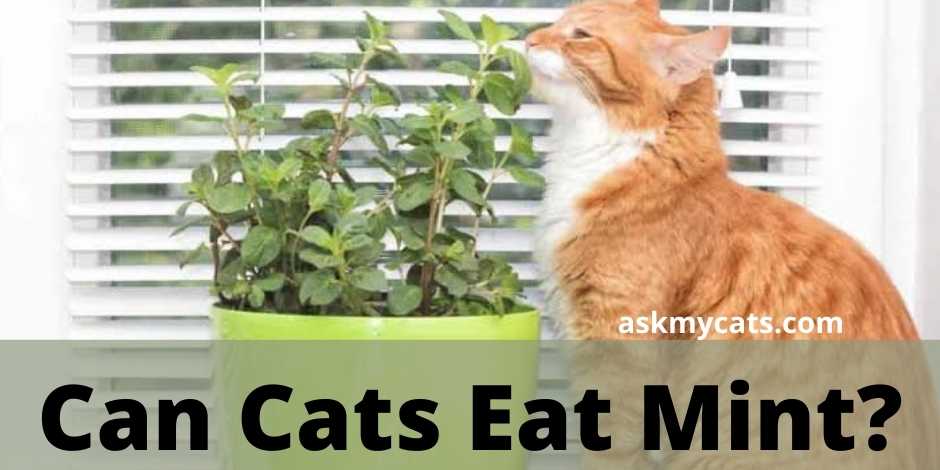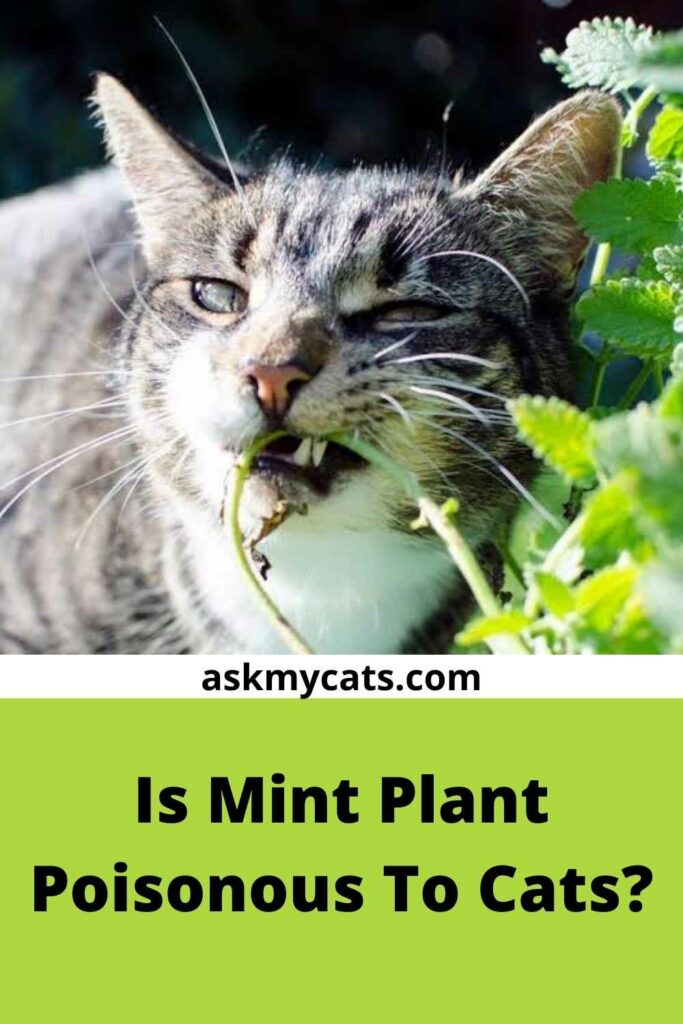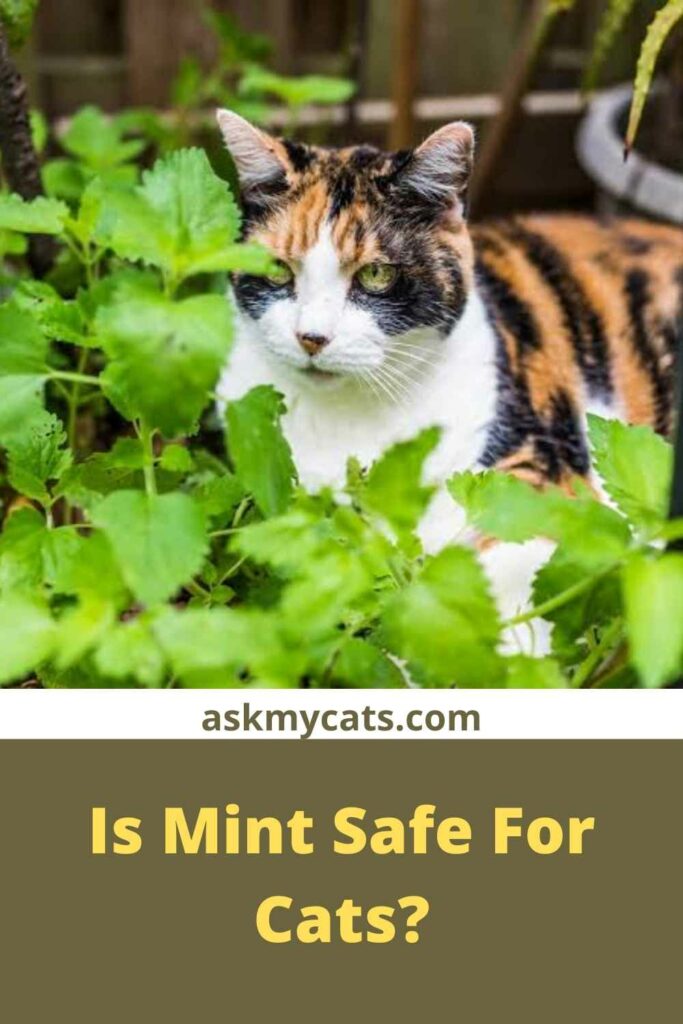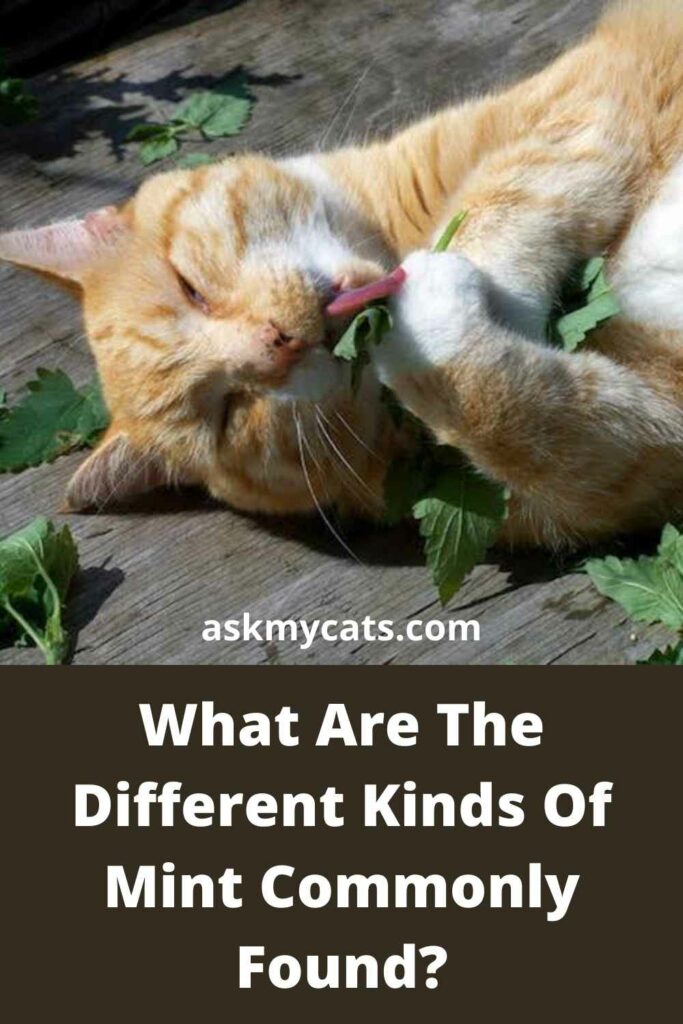Mentha is the scientific name for mint plants that belong to the Lamiaceae family. Their square stems, large leaves, and unique scent make them easily identifiable. A mint genus is a large group of plants that includes a variety of species that cats may respond to in various ways.
No, cats should not eat mint. The stem, blossom, and leaves of the mint plant are all included in this. Peppermint essential oils, which are poisonous to cats, are found in all mint plants.
Instead of mint, your cat can consume catmint, which is another term for catnip. Catmint is a harmless plant that cats are known to enjoy and that they may ingest safely.
Mint poisoning is a rare condition in cats. While several species of the mint genus are toxic to cats, they are usually only dangerous in large quantities.
If you want to learn more about the effects of mint on your feline friend, keep reading!


Give Your Cat the Perfect Day
Get the Free Ebook!
Do Cats Like or Hate Mint?
Mint is attractive to cats because of the scent it emits. Mint may be used as a replacement for catnip, so if your cat can’t get enough of mint-flavored items, try putting out catnip instead.
Catnip is safe for cats to consume, and they’ll be so preoccupied with their favorite delicacy that they’ll likely avoid the mint in the future.
While most cats despise the fragrance of this plant, some like it. This is owing to the presence of nepetalactone, a molecule that closely resembles those present in catnip, which is known to attract cats.
However, not every cat will enjoy this plant. Some cats will enjoy it, while others will dislike the scent or flavor. It all depends on your cat’s sensitivity.
Is Mint Plant Poisonous To Cats?

Essential oils found in mint plants are harmful to cats in their pure form. Essential oils are extremely concentrated versions of a taste found in plants with a strong fragrance or flavor. If your cat eats too much mint, this is what will make them sick.
Mint essential oils are not particularly dangerous but essential oils in the concentrated form will make your cat sick. However, cats prefer to munch on mint leaves, which will not provide a lethal amount.
However, if your cat is vomiting and you believe the mint patch in your yard is to blame, here are a few symptoms to look for.
- Stomach ache
- Nausea
- Weakness
- Vomiting
- Diarrhea
If any of these symptoms persist for more than an hour, take your cat to the veterinarian.
Is Mint Safe For Cats?

Mint plants, including their stems, blossoms, and leaves, are poisonous to cats because they contain essential oils.
Garden mint essential oils have also been shown to relax the esophageal valve, increasing the likelihood of vomiting in a cat that is already sick. Cats that already have bowel, intestinal, or liver illnesses are more likely to be affected.
Some species, such as the pennyroyal, may also have more harmful consequences, such as liver damage.
If your cat consumes a large amount of any Mentha species, expect diarrhea and vomiting. Weakness and nausea are two more potential symptoms.
Aside from eating them, some cats may develop skin allergies, making topical use of these herbs’ essential oils unsafe.
There’s also the risk that they’ll cause an allergic response.
If you suspect poisoning, see your veterinarian for a diagnosis and treatment. Depending on the severity of the poisoning, stomach decontamination, supportive care, and other procedures will be performed.
What To Do If My Cat Has Mint Poisoning?
Take your cat to the veterinarian if you suspect mint poisoning. They’ll begin by monitoring your pet and determining how severe the symptoms are.
If your cat has a severe condition, they will make her vomit or pump her stomach if required.
Your cat may need to be admitted to the hospital to stay hydrated. However, you do not need to worry as your kitten will be fine after the symptoms are passed.
What Are The Different Kinds Of Mint Commonly Found?
The different kinds of mint commonly found are:

1. Catnip
Catnip is known by a variety of names, including catmint, catswort, and catwort.
Catnip is a kind of mint plant that most cats find appealing. There are several causes for this. The plant’s appealing scent and stimulating effects on cats are the major causes.
The main component in catnip, nepetalactone, is responsible for the pleasant scent and stimulating effects.
Catnip is still a potentially dangerous herb for your cat, according to the American Society for the Prevention of Cruelty to Animals (ASPCA), despite its advantages.
2. Peppermint
Peppermint does not entice cats in the same way as catnip does. Although peppermint has a nice minty scent, cats are repelled by it.
In addition, peppermint includes a molecule called salicylate, which is toxic to cats. It’s possible that your cat won’t realize how deadly salicylate is until it eats peppermint leaves.
It’s worth mentioning, though, that not all cats are put off by peppermint. Your cat may be drawn to peppermint because it contains chemicals that are similar to nepetalactone. Just make sure your cat isn’t eating the peppermint leaves.
3. Spearmint
Spearmint, also known as garden mint, is commonly found in tea, sweets, and spice. When compared to peppermint, it has a reduced salicylate content.
As a result, spearmint is less hazardous than peppermint in terms of toxicity. However, like with any other mint, you should keep an eye on your cat to make sure he doesn’t consume any spearmint.
If your cat consumes too much garden mint, it might irritate her stomach. Garden mint essential oils have also been shown to relax the esophageal valve, increasing the likelihood of vomiting in a cat that is already sick.
Why Is My Cat Obsessed With Mint?
Your cat is fascinated with mint because it’s sometimes confused with catnip, another herb from the mint family. Cats adore the scents of catnip and mint, and will often seek them out if they detect them in your home.
Cats have a keen sense of smell, so they won’t have any trouble finding it
Because of the peppermint scent, most cats are interested and drawn to mint plants. Cats may be put off by some strong herbal odors, but they aren’t scared of all the plants in your yard.
Keep your mint plants away from your cats to avoid them nibbling on the leaves!
Can Cats Eat Mint Leaves?
No, cats cannot eat mint leaves. Mint plants, including their stems, blossoms, and leaves, are poisonous to cats because they contain essential oils.
As a result, cats should avoid consuming mint leaves or essential oils. It has a significant negative impact on their health.
Can Cats Eat Mint Ice Cream?
Mint ice cream, like mint chocolate, has far too many artificial sweeteners and other chemicals to be suitable for cats. Therefore, do not allow your cat to eat mint ice cream.
Keep mint ice cream and chocolates away from your feline. It may cause a negative impact on her health.
Is Mint Candies Bad For Cats?
Do not give mint candies to your pets. It’s common to find spearmint and peppermint oil in them. Wintergreens can also be found in some sweets.
Sugar, corn syrup, and titanium dioxide are included in these scotch, soft, or hard candies. Sugars and corn syrups are bad for cats since they can cause gastrointestinal problems, obesity, and other problems.
Mint candy includes tiny amounts of mint essential oil, which is toxic to cats. Furthermore, mint candies include artificial sweeteners, all of which are harmful to cats.
Any mint candy, regardless of its label, is poisonous to cats. That includes the mojito mint, which is infused with lime juice and contains white rum.
Finally, stay away from Sweet Mint Gum, Orbit, jellies, and any other substance that is harmful to your cat.
Is Mint Gum Bad For Cats?
Even though your cat may like mint, giving them mint gum or breath mints is not suggested. Your cat may be interested in these products because they like the fragrance of mint, but if they eat the gum, it may be dangerous to them.
Xylitol or other artificial sweeteners are frequently included in mint gum. While they are safe for people to consume, any item containing that component is not good for cats.
Xylitol can cause your cat’s blood sugar to drop to dangerously low levels quickly, resulting in a variety of severe responses.
In cats, these symptoms include weakness, tremors, seizures, and vomiting. Keep your mint-flavored chewing gum out of reach of your cat.
If your cat is still focused on mint, have catnip available at all times to keep them occupied. Catnip is actually what they prefer, and it’s a far healthier option for your feline.
Can Cats Get High On Mint?
Yes, cats may get high on mint. Cats get high on catnip via breathing nepetalactone, which may be found in a live plant, dried plant material, or oil extract.
The substance binds to receptors in a cat’s nose, stimulating sensory neurons that lead to the brain. This appears to affect activity in the olfactory bulb, amygdala, and hypothalamus, among other regions of the brain. This final region is important in controlling the animal’s emotions, among other things.
In most cats, nepetalactone causes a strong, inebriated response, regardless of the underlying cause.
Keep in mind that one of the most typical effects of catnip is lethargy or “stoned ness,” which is easily confused with mint poisoning weakness. Understand how your cat reacts to modest doses of catnip. It’s a reason for concern if it normally makes them hyper, but this time they’re suddenly calm.
Do Cats Like Mint Scent?
Because mint smells like catnip, cats enjoy mint-scented items or plants. Catnip is a perennial mint plant of the Labiatae family. Your cat will identify and be drawn to both herbs since they have many comparable characteristics.
As you can see, cats are attracted to mint in a natural way. They are enamored with the scent, taste, feel, and everything in between.
Frequently Asked Questions
Is Catmint Good For Cats?
Catmint, also known as Nepeta Faassenii, is as much of an aphrodisiac to cats as its more well-known species companion. It is good for cats if they consume it in moderation.
Are Peppermint Leaves Safe For Cats?
Peppermint leaf powder is a botanical that is known for calming and balancing the digestive system. Essential oils found in most mint plants can cause harmful effects on plants. Thus, peppermint leaves are not safe for cats.
Do Cats Like Mint Scent?
Mint and strong mint-related scents, such as wintergreen and menthol, are among the smells cats despise. This might be for good reason since mints can make cats vomit and have diarrhea.
Final Words
In all of its forms, the mint plant is poisonous to cats. There is no such thing as a safe manner for cats to enjoy mint due to its toxicity. The best thing you can do is keep the plant as far away from your cat as possible.
The best way to protect your cat from mint poisoning is to learn to recognize mint plants and map out where your cat could come into contact with them.
Feel free to drop your queries regarding your feline friend in the comment section below.

My cat tries to steal the Allen’s mint lollies out of my mouth and she licks me them she bites me is this ok what happens if she licked my sliver and abit of the mint
Hello tijana,
Mint candies should be avoided as they are not good for your cat.
Although occasional lick doesn’t make any severe complication but still it has to be avoided.
Happy Cat Parenting